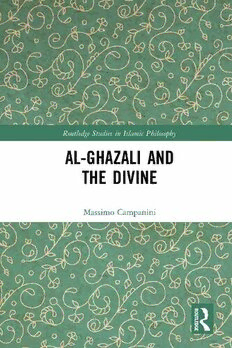
Al-Ghazali and the Divine PDF
Preview Al-Ghazali and the Divine
- -ı Al-Ghazal and the Divine Thisbookexaminesthephilosophyofal-Ghaza-l-ı,analysinghisconceptionof God within Islamic theology. Seeking to contribute to the greater under- standing of Muslim thought, it analyses his ‘orthodox’ theory, based on the - notion that the spiritual struggle (jihad) and philosophical enquiry are informed by the possession of firm science (‘ilm). Exploring a wide range of Arab texts and Arab primary literature, this book therefore examines a crucial period of Medieval Islamic history, while emphasizing the multifarious and byno means monolithic components of the Muslim outlook. In seeking to understand Islamic religion as a creative and progressive heritage, it also demonstrates the moderate and balanced char- acter of mainstream Islam, and ultimately argues that al-Ghaza-l-ı’s thought is the best expression of Islamic intellectuality and spirituality. Taking a theoretical approach, this book will be useful to students and scholars of Islamic philosophy, theology and history. Massimo Campanini is Professor of Islamic Studies, having taught at the uni- versities of Urbino, Naples and Trento. His recent publications include The Qur’an: Modern Muslim Interpretations (Routledge, 2011) and Philosophical Perspectives on Modern Qur’anic Exegesis (Equinox Publishing, 2016). Routledge Studies in Islamic Philosophy Series Editor: Oliver Leaman University of Kentucky The Routledge Studies in Islamic Philosophy Series is devoted to the pub- lication of scholarly books in all areas of Islamic philosophy. We regard the discipline as part of the general philosophical environment and seek to includebooksonawidevarietyofdifferentapproachestoIslamicphilosophy. Avicenna’s Al-Shifa Oriental Philosophy Sari Nusseibeh Becoming a Genuine Muslim Kierkegaard and Muhammad Iqbal Sevcan Ozturk Al-Ghazali and the Divine Massimo Campanini The Philosophy of Religion in Post-Revolutionary Iran On an Epistemological Turn in Modern Islamic Reform Discourse Heydar Shadi - - ı Al-Ghazal and the Divine Massimo Campanini Firstpublished2019 byRoutledge 2ParkSquare,MiltonPark,Abingdon,OxonOX144RN andbyRoutledge 711ThirdAvenue,NewYork,NY10017 RoutledgeisanimprintoftheTaylor&FrancisGroup,aninformabusiness ©2019MassimoCampanini TherightofMassimoCampaninitobeidentifiedastheauthorofthiswork hasbeenassertedbyhiminaccordancewithsections77and78ofthe Copyright,DesignsandPatentsAct1988. Allrightsreserved.Nopartofthisbookmaybereprintedorreproducedor utilisedinanyformorbyanyelectronic,mechanical,orothermeans,now knownorhereafterinvented,includingphotocopyingandrecording,orin anyinformationstorageorretrievalsystem,withoutpermissioninwriting fromthepublishers. Trademarknotice:Productorcorporatenamesmaybetrademarksor registeredtrademarks,andareusedonlyforidentificationandexplanation withoutintenttoinfringe. BritishLibraryCataloguinginPublicationData AcataloguerecordforthisbookisavailablefromtheBritishLibrary LibraryofCongressCataloginginPublicationData Names:Campanini,Massimo,1954-author. Title:Al-Ghazaliandthedivine/MassimoCampanini. Description:NewYork:Routledge,[2018]|Series:Routledgestudiesin Islamicphilosophy|Includesbibliographicalreferencesandindex. Identifiers:LCCN2018019853|ISBN9781138542372(hardback)|ISBN 9781351008969(ebook) Subjects:LCSH:Ghazzåalåi,1058-1111.|God(Islam)|Islamicphilosophy. Classification:LCCB753.G34M3852018|DDC297.2092–dc23 LCrecordavailableathttps://lccn.loc.gov/2018019853 ISBN:978-1-138-54237-2(hbk) ISBN:978-1-351-00896-9(ebk) TypesetinTimesNewRoman byTaylor&FrancisBooks Contents List of illustrations vi Acknowledgements vii Introduction: Al-Ghaza-l-ı and the Qur’a-n: preliminary remarks 1 1 Al-Ghaza-l-ı and his time: His thought in context 17 2 Science and action 43 3 Al-Ghaza-l-ı’s theology and metaphysics 82 4 Islamic Ghazalian theology and Christian theology 136 Index 151 Illustrations Figures 3.1 105 3.2 106 Tables 2.1 47 2.2 48 2.3 48 2.4 49 Acknowledgements IhavetothankfirstofallOliverLeaman(UniversityofKentucky)whoisthe publisherofthisbook,whichispartoftheRoutledgeseriesofwhichheisthe editor. Imet Oliver for the first time in 1990andwe havecooperated together onmanyoccasionssincethattime.Thepublisheritself anditsstaff(especially Joe Whiting, Emma Tyce, Georgina Bishop and Alison Phillips) have to be thanked for their help, care and skill. The book is the final outcome of more than thirty years of continuous studyof the Qur’a-n, al-Ghaza-l-ı and hiswork. I owe a debt of thanks to many people. I cannot thankeveryone who helped, counselled and corrected me, but I should like to mention especially Hasan Hanaf-ı (formerlyoftheUniversityofCairo),NasrAbu- Zayd(formerlyofthe Universities of Cairo and Leiden, who sadly died in 2010), Mokdad Arfa Mensia (formerly of the University of Tunis), Francesca Corrao (LUISS University, Rome), Giovanni Filoramo (formerly of the University of Turin), MariateresaFumagalliBeonio-Brocchieri(formerlyoftheUniversityofMilan), Annamaria Lazzarino Del Grosso (formerly of the University of Genoa), ClaudioLoJaconoandMicheleBernardini(Istitutoperl’OrienteofRomeand Oriental University of Naples), Alberto Melloni (University of Modena and Reggio Emilia), Emanuela Patella (Centro ligure di studiorientali, Genoa), Franco Buzzi, Pierfrancesco Fumagalli, Giovanni Canova, Paolo Nicelli and AlbaFedeli(AmbrosianLibraryand Academy,Milan).The others knowthat I have not forgotten them. Donatella and Emanuele are always present. It goes withoutsayingthatallerrorsinthisvolumearemine. Massimo Campanini Milan, February 2018 This page intentionally left blank Introduction - -ı ’- Al-Ghazal and the Qur an: preliminary remarks Why al-Ghaza-l-ı and the Qur’a-n When I began to study Islam in 1980, I came across almost by chance two passageswhichstimulatedmyinterest.Thefirstwasthefollowingbyal-Ghaza-l-ı: As to the issues which [theology] deals with, all of them are concerned with theoretical reflection on God Most High. For if we reflect on the world, we do not reflect on it insofar as it is world, body, Heaven and Earth, but insofar as it is the workof God. And if we reflect on the Pro- phet–blessGodandsavehim!–wedonotreflectonhiminsofarasheis a man, honourable, knowledgeable and righteous, but insofar as he is the Messenger of God. … There is no speculation but about God. (1972: 10, 2013: 5–6; translation slightly modified) Al-Ghaza-l-ı achieved this awareness throughout his life as he developed his understanding of the religious sciences: ‘We have looked for the knowledge of what is different from God’, he once inveighed against himself and against his brother Ahmad, ‘but [knowledge] refused [to deal] with any other but God (talabna- al-‘ilm li-ghayr Alla-h fa aba- an yaku-na illa- li’lla-h)’ (quoted in Moosa 2005:90). In the Jawa-hir al-Qur’a-n (Jewels of the Qur’a-n) we also read: ‘The highest and noblest knowledge is that of God Most High and all the other sciences are pursued on Its behalf and because of It1 (al-Ghaza-l-ı 2015: 117, ch. 4). Obviously, this idea permeates all Muslim thought. In the Mu‘tazilite tra- dition therewas the theme ‘every instant passed without the knowledge of God is wasted’ (quoted invan Ess 2002: 152). Tawh-ıd, God’s unity and oneness, is the very pillar of Islam. The second passage I hinted at above is chapter (su-ra) 112 of the Qur’a-n, - - the surat al-Ikhlas: Say: It Alla-h [is] One, Alla-h the unfathomable.2 It did not beget nor was - - It begotten and nothing is equal to It (Qul huwa Allah ahad Allah al- samad lam yalid wa lam yu-lad wa lam yakun lahu kufu’an ahad).3
